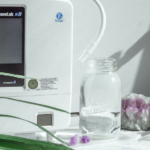 There is a huge difference between alkaline water and alkalized water. Alkalized water has a multitude of different health benefits, whereas alkaline water does not. There’s a misconception that all alkaline water is healthy and high quality. To be legally labelled “alkaline,” water just needs to have a pH above 7.0, regardless of the process it’s gone through to get there.
There is a huge difference between alkaline water and alkalized water. Alkalized water has a multitude of different health benefits, whereas alkaline water does not. There’s a misconception that all alkaline water is healthy and high quality. To be legally labelled “alkaline,” water just needs to have a pH above 7.0, regardless of the process it’s gone through to get there.
What’s the difference between alkaline water and alkalized water?
Alkaline water has gone through a CHEMICAL change. The bottled “alkaline water” that you find in stores has had synthetic minerals added to it (such as sodium bicarbonate, magnesium, calcium, etc.) in order to inorganically raise the pH above 7.0. True ionized alkaline water will only last around 24 hours before it begins to lose its pH properties; so, how can bottled alkaline water sold in stores have any health value when it’s been on shelves for months?
Alkalized water has gone through an ELECTRICAL change, through the process of electrolysis. There are no added chemicals or synthetic minerals. The electrolysis process is the only way to make alkaline ionized water, and it is the only water that has been researched by medical scientists and proven to have health beneficial properties.
NOTE: Ionized alkaline water goes by several different scientific names and those names include electrolyzed reduced water, alkalize reduced water, alkalized ionized water, reduced water, and ionized water.
Alkalized is a more specific term for the type of alkaline water Kangen water is.
Benefits of alkalized water:
- Rich in active molecular hydrogen and antioxidants
- Assists in neutralising and removing free radicals from the bloodstream
- Enhances energy levels and overall aerobic capacity
- Helps prevent premature aging
- Hydrates your body more quickly and effectively because of its micro-clustered properties (ie. water containing fewer molecules, thus smaller and easier to penetrate cell walls)
Learn more about Kangen water:
